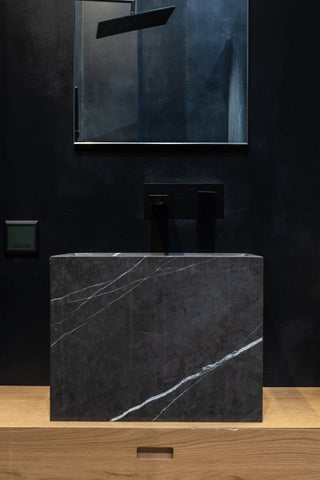- Home
- Shop
- Living
- Blog
- MIKOLITE
- SinterTech
- About
- Gallery
- Sign in
November 05, 2024
Sintered stone is revolutionizing the world of interior and exterior design. As an advanced, high-performance surface material, it seamlessly blends durability, aesthetics, and sustainability. In this comprehensive guide, we delve into everything you need to know about sintered stone, its properties, benefits, applications, and care tips.

Sintered stone is an engineered material created through the combination of natural raw materials, including minerals and clays, which are subjected to intense heat and pressure. This process mimics the natural formation of stone, resulting in a surface that is incredibly strong, non-porous, and resistant to a variety of environmental and physical factors. And doesn't have the health risk of engineered quartz which has silica components.
Sintered stone is nearly indestructible, with a Mohs hardness rating between 6 and 7. This level of hardness makes it highly resistant to scratches, impacts, and heavy wear, ideal for both residential and commercial use.
Sintered stone can withstand extreme temperatures without cracking or discoloring. It’s highly resistant to fire and heat, making it an excellent choice for kitchen countertops, fireplace surrounds, and outdoor applications where exposure to high temperatures is a concern.
Unlike some natural stones that can fade over time due to sunlight exposure, sintered stone maintains its color and appearance when exposed to UV rays. This quality makes it an optimal choice for outdoor applications such as facades, patios, and outdoor kitchens.
As a non-porous material, sintered stone repels liquids, reducing the risk of stains and water damage. It’s an excellent option for spaces prone to moisture, such as bathrooms, kitchens, and outdoor areas.
Made from natural raw materials, sintered stone is free from resin, adhesives, and chemicals, contributing to a sustainable and eco-friendly choice. Many sintered stones are recyclable, further enhancing their appeal to environmentally-conscious consumers.
Unlike natural stones like marble or granite, sintered stone requires minimal maintenance. Its non-porous nature means it does not need to be sealed, and regular cleaning with a mild soap and water solution is often sufficient.

Sintered stone can replicate the look of marble, granite, wood, and other materials, offering diverse aesthetic options that suit various design preferences. Its versatility extends to a variety of textures, colors, and finishes that complement both modern and classic interiors.
With advanced manufacturing processes, sintered stone can be produced in different thicknesses, formats, and colors, allowing for customized solutions tailored to specific project requirements. Architects and designers can specify unique sizes and patterns that best meet the needs of their projects.
Thanks to its resistance to heat, scratches, and stains, sintered stone is a popular choice for kitchen countertops. It handles the rigors of cooking environments well, maintaining its integrity and appearance even with heavy usage.
In bathrooms, sintered stone’s water resistance and durability are invaluable. It’s used for vanities, shower walls, and flooring to create a sleek, modern look without sacrificing functionality.
Sintered stone’s durability and aesthetic appeal make it ideal for both flooring and wall cladding in high-traffic areas. It provides a seamless, luxurious appearance that adds depth and character to any room.
Sintered stone’s UV and weather resistance allow it to withstand outdoor conditions, making it suitable for exterior walls, facades, and patios. Its resilience ensures that outdoor surfaces remain beautiful and intact for years to come.
Sintered stone is created through a process called sintering, where raw materials are compacted under high pressure and then heated at temperatures above 1200°C. This process compacts the material, creating a dense, non-porous surface with minimal maintenance needs.
| Feature | Sintered Stone | Natural Stone | Quartz |
|---|---|---|---|
| Durability | Extremely high | High | High |
| Scratch Resistance | High | Moderate | Moderate |
| Heat Resistance | Very high | Varies | Moderate |
| UV Resistance | High | Low | Low |
| Maintenance | Low | Moderate to high | Moderate |
| Environmental Impact | Low | High | Moderate |
Sintered stone’s low maintenance is one of its main appeals. However, following these guidelines ensures its longevity:
Sintered stone combines the best aspects of natural and engineered surfaces, making it a superior choice for modern applications. Its durability, low maintenance, and wide range of aesthetics mean it can fit seamlessly into almost any design plan, providing both form and function.
Whether you’re working on a new kitchen, bathroom, or outdoor project, sintered stone offers an enduring, beautiful solution that enhances the appeal and value of any space. And now, there are many factory purchasing options which make it very affordable. Just make sure you plan ahead for shipping!
Comments will be approved before showing up.
